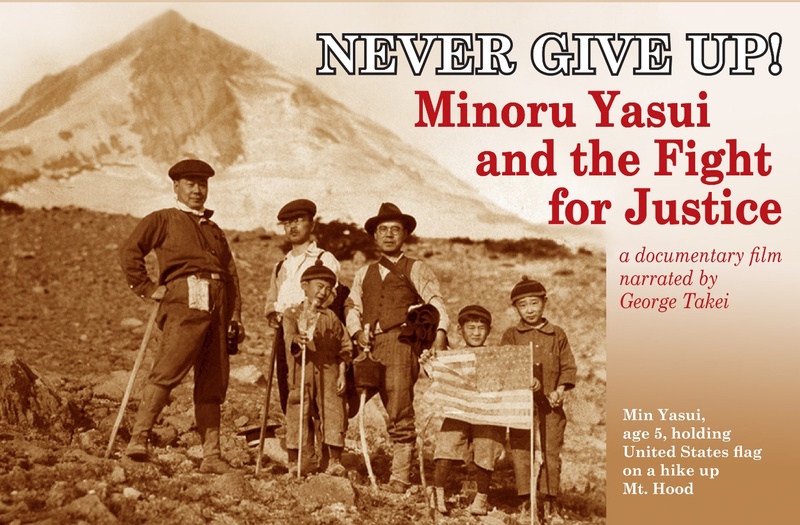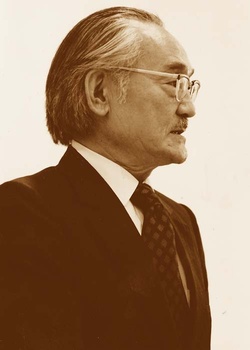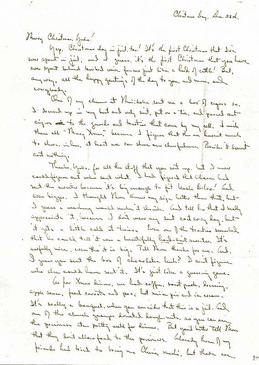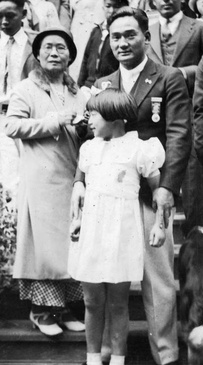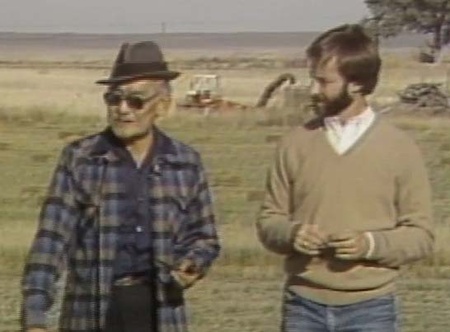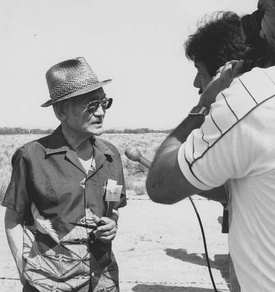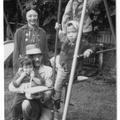“We need more people like Min Yasui in the world—who are willing to stand up for what is right, for whom principles of justice are more important than personal comfort. I’m honored to be able to work on this film, about a man whose story needs to be heard by a wider audience.”
—Will Doolittle, co-director, Never Give Up!
November 2 is Day of the Dead in Mexico, and I live in the very fiesta-prone town of San Miguel de Allende. It is not a sad day but a colorful and joyous holiday. Families and institutions build beautiful altars to their deceased loved ones, often opening their doors to the public to share in their homages and celebrations.
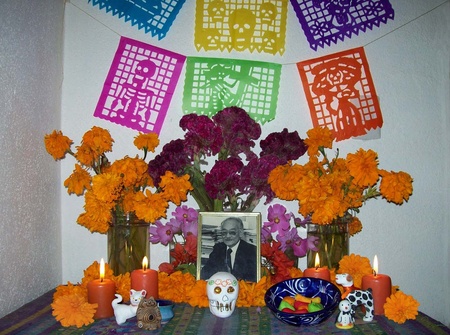
So I decided to officially inaugurate an online homage and celebration for my late father, Minoru Yasui on Day of the Dead, to share the work our team is doing on the film Never Give Up! and to launch a fundraising campaign to finish it: minoruyasuifilm.org.
I’ve always wanted to make a film about my dad, but wasn’t able to devote the amount of time necessary until I retired. And once I decided to dedicate myself to this project, the pieces fell into place. Will Doolittle, an Oregon filmmaker with extensive experience in documentary work, agreed to co-direct and do camerawork and editing; and social media maven George Takei, of Star Trek fame and currently starring in his Broadway musical Allegiance, agreed to do the narration. This year, because of increasing workload, I contacted Kelley Baker, a former student at USC where I was a graduate teaching assistant, to help out as Associate Producer. Kelley also has a lifetime of experience as an independent filmmaker. Shoji Kameda, a friend of Will’s and an internationally renowned musician, has agreed to write an original score for the film. This stellar team is working on the project because they feel that Min Yasui’s inspiring story needs to be told to a wide audience.
Min Yasui was an extraordinary person who stood up to the greatest power in the world, the U.S. government, because he believed with all his heart and soul in the democratic ideals of liberty and justice for all. And he continued, all his life, to fight for those ideals. He never gave up!
In 1942, he initiated a legal test case by deliberately violating military orders that resulted in the imprisonment of 120,000 persons of Japanese ancestry in U.S. concentration camps. He spent 9 months in solitary confinement awaiting the appeal of his case to the U.S. Supreme Court, which ruled against him. But he continued to defend the human and civil rights of all people.
In Denver, where he relocated after the war, he helped to found and participated in a myriad of community organizations, fighting for the human and civil rights of Blacks, Latinos, Native American, religious minorities, immigrants, children and youth, senior citizens, low-income people; he also initiated and was active in national networks and international exchanges.
During the last years of his life, Min Yasui devoted himself totally to the redress movement. He reopened his legal case in 1983. He attended thousands of meetings, he made hundreds of speeches, and he wrote thousands of letters in support of redress.
When he died in 1986, his legal case was in appeal. His family took his case to the U.S. Supreme Court, but they refused to hear it in 1987, the bicentennial of the U.S. Constitution, which Yasui had so steadfastly defended all his life. Two years after his death, Congress passed the Civil Liberties Act of 1988, which included a government apology and reparations for all survivors of the U.S. concentration camps.
During the push for redress, many of Min Yasui’s interviews and speeches were filmed, for national news, local stations, and “home movie” recordings. Now, more than 30 years later, only a handful of clips survive—but they speak volumes.
I’m lucky that my Aunt Yuka, my dad’s favorite “baby sister,” saved hundreds of family photographs and documents, including handwritten letters from jail! My dad also saved voluminous papers, now held by the Auraria Archives in Denver, Colorado, so I have a wealth of materials I’m using in the film.
Yasui on Yasui
In 1988, my cousin Lise Yasui produced an Academy Award-winning film, Family Gathering. When I asked her about outtakes—footage filmed but not used in the final cut—Lise came up with an impressive list of materials, but all in old formats, which are extremely expensive to transfer to modern media. So I used a few clips from the film itself, an interview done in our Aunt Yuka’s kitchen. Lise says of her uncle:
“He always insisted that his fight to right the injustices of the 1940s was not an attempt to rewrite the past but to make the future a safe place for human rights and personal dignity.”
Other recordings
I also contacted former Salt Lake City television news producer Michael Goldfein for permission to use his short piece Citizen Min. Says Goldfein, who is now in Washington DC writing a historical study about government policies toward Japanese Americans during World War II:
“The life and legacy of Minoru Yasui is indisputably one of the great stories of heroism in America’s civil rights history. In 1983, as a young reporter, I had the opportunity to tell his story. The trip I took with him, visiting the site of his arrest in Portland and his ultimate internment in Minidoka, was a touchstone moment in my life. Min’s enduring passion for fairness needs to be seen and heard.”
In 1985 Steven Okazaki’s documentary Unfinished Business, about the re-opening of three Japanese American legal cases—Yasui, Hirabayashi, and Korematsu—was nominated for an Academy Award. Okazaki interviewed Yasui at his brother’s farm in Hood River. Says Okazaki:
“Min Yasui was brilliant, dapper, funny, controversial, and inspiring. I don’t know of anyone who was so principled, so absolute in his faith in justice, and the necessity to speak up for and live by one’s beliefs. I met him over thirty years ago and was struck by the power of his personality, warmth, and decency. I had to smile and wonder if he was real. Thirty years later, I know he was the real thing.”
A former professor at the University of California, San Diego, Jim Lin, contacted me through an online magazine. Jim had several videocassettes of Min’s rousing presentations at the first Asian American studies program, which Lin organized. Recorded in the spring of 1986, just months before he was diagnosed with cancer, those tapes are among the last made of the great orator. They illustrate better than any other footage I’ve been able to find the passion and conviction of Min Yasui’s oratory.
In 2014, Will Doolittle and I shot interviews in Oregon, California, and Denver with twenty people who knew Min Yasui and/or his work during different periods of his life. Once we started editing, it became apparent the material merited a longer format than the 15-30 minutes originally planned. Thus the decision to raise funds for an hour-long film. We are seeking $50,000 to complete Never Give Up! and for 2016 events planned for the centennial of the birth of Min Yasui, as well as a school curriculum about this American hero whose life and work can be an inspiration for generations.
* * * * *
Visit the Minoru Yasui Film website for more information on the film or to make a donation.
© 2015 Holly Yasui


